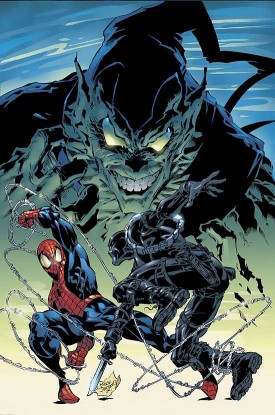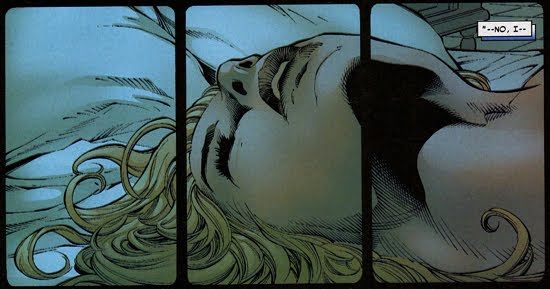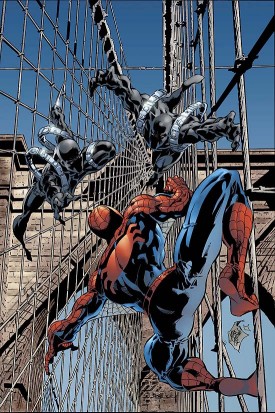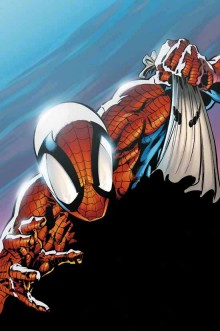
This was the summer in which Marvel Comics and writer J. Michael Straczynski (also creator and architect of Babylon 5) promised to really stir things up for Spider-Man by bringing back Gwen Stacy…or were they? Certainly, a cover image previewed at conventions made it seem like it. Instead, the answer turned out to be that Gwen had had a daughter (and a son), nearly identical to her mother, with an accelerated growth that had aged her to adulthood in the time between birth and the present day of the Marvel Universe — how long has that been in real time? You’ve got me.
But that wasn’t quite what got fandom talking about Amazing Spider-Man. It was the revelation of the father of the twins just a couple of weeks ago. It hit me like a punch in the gut, but I still recommended the book, knowing people would be upset — hopefully, in a good way.
Then came complaints in the comic book shop, with a few people threatening to cancel their subscriptions. They spilled over to our forums. And on moviepoopshoot.com, writer Scott Tipton posted an open letter to Straczynski expressing, for whatever it’s worth, his displeasure.
So I contacted JMS, to ask him just what he was thinking when writing the storyline called Sins Past. You may be surprised. You may be angered. But you’ve got to admit, he didn’t write this storyline lightly — nor will he be going away leaving Peter Parker in a great mess for some other writer to clean up.
Fanboy Planet: Judging from internet reaction to the latest storyline in Amazing Spider-Man, you’ve alienated almost as many fans as you brought onboard in the first place. Did you know you’d be causing such an uproar? How do you respond to fans so angry they claim they’re dropping the book?
J. Michael Straczynski: I don’t buy the premise behind the question. The thing about the internet is that you have to be careful not to confuse volume with numbers.
There are some folks who are very visibly and audibly perturbed at the storyline, and they are all over the place registering their annoyance. You see the same people — sometimes under the same names, sometimes under alternate names — posting the same messages on different systems. If 6 people leave 30 messages apiece in different places, it seems like there’s something big going on…but there isn’t.
Over on the Marvel newsgroup, you’ve got maybe about ten to twelve people who are bugged at the story and continuing the discussion. Ditto for the comicboards.com forum, and most of the others. And again, there’s a lot of overlap. This out of a readership of well over a hundred thousand per issue.
And for every bugged reader, two or three more come out of the closet — most publicly, a few privately — to say that no, they like what’s being done. The problem, of course, is that you will always hear more from those who don’t like something than from those who do. That’s as cold certain a fact as you can ever find, and any person with a background in public opinion measurement will tell you that. So I really don’t put a lot of stock in it, and I think your assumption isn’t supported by the numbers. Three people shouting in a room of thirty makes for a loud room…but again you have to separate volume from numbers.
What’s significant, perhaps more significant, are the sheer number of people who have come back to the title, drawn in by the Sins Past storyline. A lot of folks have said publicly, and privately (more the former than the latter, which is good) that they’d kind of lost interest over the years because nothing was really being done with the characters, nothing was changing, and they were glad to see somebody actually doing something with the characters that showed them in a new light. Retailers are increasing their orders.
And for good or bad, for the first time in a long time, people are talking about the title and arguing about it…and that’s a positive thing.
Storytelling means you have to take chances. Look over at the competitors…what was done with Jason Todd, or Hal Jordan over the years, or others there and at Marvel…if you don’t shake things up once in a while, the book stagnates. Yeah, you could do a book just for the core fans, for people who don’t want to see any changes at all…but you’d be selling maybe fifteen thousand books a month, and it would go out of print instantly. If you don’t take chances and try things, you’re just telling the same story over and over…yeah, the costumes change, but it’s all just fights.
And you can’t make just safe changes because a) it’s not a change, and b) there’s no such thing. Lots of people who said they didn’t like the Gwen aspect said they’d prefer it if it had happened to MJ…and the MJ fans arose with torches and pitchforks to put down THAT idea. It becomes a matter of whose oxen are being gored.
And I will say that some of the criticism is, itself, in my opinion, out of line in terms of the rage directed not against me but against Gwen. Do a Google search for Gwen’s first name and the words slut, whore and tramp. Some of these people, who claim she is an important character, someone they care about, were the first ones to go right to calling her a whore because she had sex. To call someone — ANYone — a slut, a whore, or a tramp because she had sex (apparently just the one time) shows some deep underlying psychological issues that need to be addressed, which have nothing to do with what’s inside the book and a lot to do with what’s in the minds of those readers. As I said elsewhere, I’ve heard about the madonna/whore complex, but I’ve never seen it played out on this magnitude before.
It’s a hot-button issue for some people who identified with Peter, and who may have had their own issues with fidelity or women before, and so it becomes very emotional for them, I won’t deny that. But I do strongly feel that the ones who’ve been the most vocal are the least representative of the majority of readers. Most readers pick up the book, read it, and either like it or don’t. Some readers post a bit online. A smaller percentage still have every single issue, cross-reference them every time a new book comes out, and go online to talk for hours, and post hundreds of messages, about a comic-book character. And even that small subset is, as near as I can tell, more happy with the storyline than not.
We all make mistakes…that’s part of what’s at the core of Sins Past. The question is how we deal with our mistakes — as Gwen dealt honorably and strongly with hers — and how others deal with our mistakes — as Peter never stops caring for Gwen even though he knows what happened. Isn’t that a good message to send to people? That we can own up to our mistakes and take responsibility and try to make things better? That those we love can see our mistakes and still care for us afterward?
I think those are valid points, and I think — part through anecdotal evidence in posts and emails, more objectively through increases in orders and positive retailer response — that the majority of readers feel the same way.
Fanboy Planet: What was Marvel’s response when you first proposed this storyline?
JMS: They thought it was a cool idea. They still do. If anything, they’re actually more happy with it now because it’s got people talking about and buying the book more than ever.
Fanboy Planet: Are you implying that Norman Osborn has some sort of hypnotic power, or is his force of personality just that strong that he could overcome the previously virginal Gwen?
JMS: He has always been portrayed as a charismatic, strong-willed guy. But look, can we get real here for a moment? Anybody out there who hasn’t known at least one young woman who — in or out of a relationship with somebody else — hasn’t made a mistake and slept with an older, possibly charismatic guy…raise your hand.
I suspect there are very few raised hands right now.
That’s kind of the amusing thing, but also the shocking thing, about some of the reactions. There were people trying to come up with ways that these could be Gwen’s kids, and they were suggesting — as probable, workable solutions — time travel, parallel dimensions, clones, a host of such ideas.
When it was suggested that she had them in the old fashioned way, by having sex, they said “THAT’S IMPOSSIBLE!” Alternate worlds and parallel dimensions and time travel and cloning are possible…but the latter is not?
We handled the aging thing by indicating that the solution Norman used to become the Goblin, which gave him an accelerated healing factor, also affected his DNA, and in turn his children’s DNA, in ways consistent with accelerated biology.
When this came out, the same small group went online to say that it would have been better if she had been raped than seduced. Better for a young woman to be raped? In what parallel universe does THAT rule exist?
A lot of this is about guys feeling guy-power threatened…the girlfriend who chooses to have sex with another guy…the woman who chooses to have sex rather than having a man impose sex on her…the woman who, once having become “damaged goods” (in the words of some posters) is now a whore, a tramp, and a slut. I specifically point to guys in this because I have not, to date, seen one woman poster come out and say that what Gwen did was unrealistic. Or use the kinds of terms that the guys have used. Not one. I think that speaks volumes to the situation.
(What gets me, incidentally, were the shockingly huge number of posts — most of it, though, again from the same bunch of guys — who said that the story was impossible because you can’t get pregnant the first time you have sex. I was stunned to see that some people actually still believe this…which helps to explain the ongoing problem with teen pregnancy.)
A lot of people who fell in love with Gwen — and I’ll admit to being one of them — did so when she first appeared back in the 60s. But a lot of time has passed, and we’re now writing for a different audience in the 2000s. Some folks want a character who doesn’t change, about whom we can never learn anything new, no surprises…someone frozen in amber for all time in a state of perfection. For thirty years. Nothing new about a character in three decades. The dust is an inch thick at that point.
At risk of getting long-winded…and I think it’s too late…let’s go back in time for a moment and return to the roots of Spider-Man and Peter Parker that some of these fans are talking about. What made Peter, and Spidey, popular, especially to geeks like me, was that he was not a perfect person. He screwed up, he got colds, he made a mistake and Ben died because of his error…perfection was anathema to the Spidey universe, and that’s what made it so relevant to the rest of us who aspired to perfection but could never achieve it.
Gwen was not a perfect person as Lee/Ditko (and later Lee/Romita) portrayed her. She had an on-and-off relationship with Peter, she was a flawed person…who became perfect after her death in the minds of many fans. And in some ways, she has become almost irrelevant to anyone outside Peter.
We have a real problem now with teen pregnancy, with people being unable to talk to each other, with relationship difficulties…how better to make the book relevant to a modern audience — which was always the intent of ASM — than to put one of our characters in that situation? The few who have a problem with the Gwen aspect tend to be over 40. That is a diminishing audience. What about the next generation coming in? Don’t we owe them someone they can relate to in ways other than nostalgia?
The subtext of Gwen’s death — which, incidentally, triggered far more protests than this has — was the death of innocence. It was portrayed in really the only way it could at that time, under the Comics Code. You could kill somebody off, sure, but to show anything more intimate was taboo. Now we can confront that metaphor a little more openly and honestly.
Whenever I write something, I bring kind of a social consciousness to it…not in the sense of trying to write in morality, because I don’t have any morality to give or to teach…but in the thematic sense. B5 was about choices, consequences and responsibility. Supreme Power is about the use, and abuse of power. The theme, for me, in Spidey is the need for people to talk to each other, and that we can accept more than those who love us think we can accept.
When Peter came out of the metaphorical closet, he discovered that Aunt May could handle his secret without dying. It became a metaphor for a lot of people who are afraid to tell their loved ones the secrets we all think they can’t handle. The situation with Gwen is much the same. The one person we think could not be able to handle this — not the fans, not the editors, not the writer, but Peter — is able to handle this information and accept that it happened, and deal with what follows. Peter’s character, as written, never says about Gwen what some of the fans who claim to be her fans say about her. He does not call her a whore, or a tramp, or a slut. He loves her…and takes on the responsibility of trying to save her kids because they are a piece of her, the ONLY surviving pieces of her.
If you find a better definition of a hero, let me know.
Fanboy Planet: With all this concern, was Gwen really previously virginal?
JMS: We never address that issue directly, and I don’t plan to do so here.
Fanboy Planet: Why, over the years, has Norman not thrown this one in Peter’s face?
JMS: Because as stated in part 5, they were initially considered to be his contingency plan, to be used against Peter if Norman should fall or die. It makes no sense to warn somebody about a plan like that. Kind of undercuts the intent.
Fanboy Planet: By giving Norman a specific grudge against Gwen, are you lessening the impact of her death upon Peter?
JMS: No. Peter’s loved one is dead. Does Norman having one additional reason for murdering her make her any the less dead? Does it make him grieve any the less? When he absently turns to say something to her, does it make her less gone from his life? What it does do, in my admittedly subjective view, is to give her death more meaning. As written before, he could’ve picked anybody…Gwen, MJ, May…it was utterly random. But if there was a secondary reason underlying it, then it has more subtext, more meaning.
Fanboy Planet: You’ve sort of redefined Peter’s powers in your run; does this, then, do something to redefine the sense of his heroism?
JMS: Again, I kind of don’t agree with the premise. His powers are the same ones he’s always had. I haven’t added any new ones, or taken away any of the old ones. The Ezekiel thread questioned where some of them may have come from, but never in a definitive way.
In terms of his heroism, I don’t think it redefines it so much as adds another layer to it. As noted above, we see that Peter loved her enough to accept something about the woman he loved that others, apparently, could not. Something that Gwen did think he could handle, because she was ready to tell him, and would have, had she not met her untimely end.
To me, when you learn that somebody has had sex once with somebody, if you call that person a whore, a tramp or a slut, that person is not a hero. That person is beneath contempt. The person who can see past that to the person, who is determined to do what he can in her memory, even though the information is painful…THAT person is a hero.
Fanboy Planet: Does this controversy make you prefer working on your own creations, such as Rising Stars? (not-so-clever backdoor plug for his imminent return to finish that series.)
JMS: Not at all. It’s a great opportunity to do some good, and I plan to continue doing so for as long as Marvel will have me…and since they just extended my contract until 2006, that should be for some time to come.
So there you have it. We’ll all still probably be arguing for months to come…but hey, if we care enough to get upset, he must be doing something right. Can I lower my hand now?





